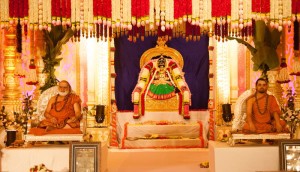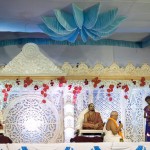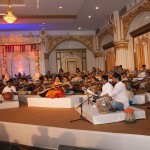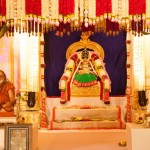Guruvandana Program at Palace Grounds, Bangalore


Ubhaya Jagadgurus Guruvandana at the Palace grounds on June 20 2015.
On June 20, 2015, a grand Guruvandana program was organised at the Grand Castle in the Palace grounds of Bengaluru by Sankara TV and Maharajakumari Smt. Vishalakshi Devi of the royal family of Mysore. When the Ubhaya Jagadgurus arrived at the venue, members of the royal family and the executives of Sankara TV, namely, Sri Hari Krishna, Managing Director; Sri G. Srinivasa, Director and Sri Suresh Kumar, CEO led the devotees in offering a devout welcome. Dhuli Pada Puja was performed by members of the royal family. After Veda Ghosha and prayer, Bhaja Govindam was played by a 50 veena troupe. Administrator & CEO of the Peetham, Sri V R Gowrishankar, speaking on the occasion, commended the services of Sri Sankara TV in broadcasting various Dharmic programs.
Gallery
Anugraha Bhashanam of Sri Sannidhanam
In His Anugraha Bhashanam, Sri Sannidhanam spoke on the need to follow Dharma and elaborated on the qualities of a noble person.
Sri Sannidhanam started His speech with a simple illustration to highlight the need to adhere to the Lord’s dictates. For any kingdom to prosper and thrive, Sri Sannidhanam explained that it is essential for citizens of the kingdom to adhere to the rules established by the kingdom’s ruler – failing which, injustice and disorder would prevail. Extending this rationale to the Universe at large and its Supreme ruler, Bhagavan, Sri Sannidhanam stated that the Lord has established rules for each of us. These rules established by the Lord are rooted in the Vedas as the foundation. The Vedas, Smritis, etc. delineate rules of accepted and unaccepted behaviour, describing those actions that beget prosperity and those that beget grief. Bhagavan has instructed all these using the Shrutis and Smritis as the foundation. Bhagavan says – श्रुतिस्मृती ममैवाज्ञे
– “ The Shrutis and Smritis are My command”.
Expounding further, Sri Sannidhanam declared that man cannot be prosperous without embracing Dharma and treading the righteous path. Man has always pursued the twin goals of happiness and prosperity. To obtain that happiness, man must necessarily walk the Dharmic Path. Instead, if he embraces Adharma, then grief is sure to befall him.
The Vedas, Smritis, Shastras and Puranas exist to teach us the nature of Dharma and Sri Sannidhanam attested to the superiority and utility of these scriptures by explaining how each person, in keeping with his/ her intellectual capacity, relies on different sources to understand the true nature of Dharma. An erudite scholar will rely on the Vedas as the foundation whereas a person of average scholarship and intellect will resort to the Smritis for clarity. Most of the common folk base their learnings on the Puranas. Essentially, all our scriptural texts exist only to show us the nature of Dharma. Dharma is expansive in nature and Sri Sannidhanam declared that the underlying goal of all these scriptures is to swerve man away from unrighteousness and to lead him towards nobility. The multitude of teachings propounded in the various scriptures ultimately culminate with the injunction that we should lead our lives as noble people and not resort to unrighteousness.
This human birth is extremely difficult to attain. Bhagavatpada has stated: जन्तूनां नरजन्म दुर्लभम्. There are innumerable species on this planet. However, man is superior to all other beings because he alone has the capacity to observe and adhere to Dharma, which is the sole cause for our prosperity. Underscoring the superiority of man over all other beings, Sri Sannidhanam advised that having obtained this human birth, we must use it to our advantage. To put things in perspective, Sri Sannidhanam explained that when we fittingly utilize an expensive object in our possession, it is reflective of the Viveka (power of discrimination) inherent in us. Therefore, if we make proper use of this invaluable gift of human birth, then there is none more discerning than us. Sri Sannidhanam invoked everyone to lead their lives as noble people do.
Expounding further on the qualities and tendencies that constitute nobility, Sri Sannidhanam quoted the following Shloka that would form the crux of His Bhashanam.
वाञ्छा सज्जनसङ्गमे परगुणे प्रीतिर्गुरौ नम्रता
विद्यायां व्यसनं स्वयोषिति रतिः लोकापवादाद्भयम् ।
भक्तिः शूलिनि शक्तिरात्मदमने संसर्गमुक्तिः खलैः
एते येषु भवन्ति निर्मलगुणाः तेभ्यो महद्भ्यो नमः ।।
Explaining the verse, Sri Sannidhanam said that a Satpurusha (noble person) will desire association with noble people, be happy rather than be jealous on observing good qualities in another person, be humble in matters related to the Guru, have interest towards learning, behave in a dignified manner towards women, fear the world’s censure or reproach and hence never tread the path of Adharma, be devoted to God, and insulate himself from those who trouble him for no reason.
Sri Sannidhanam stated that everyone must imbibe the aforementioned qualities and thereby attain Shreyas (spiritual welfare).
In conclusion, Sri Sannidhanam reflected on His Sannyasa in the month of Magha (January) of the Jaya Nama Samvatsara (2014-15). Sri Sannidhanam declared that His Guru made His life blessed by gracing Him with Sannyasa Diksha. Sri Sannidhanam exclaimed that nothing in the universe could be more auspicious than being blessed with Sannyasa by a Mahatma who hails from the lineage of Sri Adi Shankaracharya Himself. Sri Sannidhanam further stated that Sri Mahasannidhanam personally taught Him all Shastras. Sri Sannidhanam also remarked that the present day (the Adhika Ashada Shukla Paksha Triteeya) marked exactly five months of His Sanyasa. Exclaiming that these five months with His Guru had flashed like five days, Sri Sannidhanam glorified the greatness of the Presence of His Guru! Offering His Namaskara at the Lotus Feet of His Guru, Sri Sannidhanam concluded His Bhashanam.
Anugraha Bhashanam of Sri Mahasannidhanam
Sri Mahasannidhanam, in His Anugraha Bhashanam, said that Dharma Prachara has always been the foremost duty of the Sringeri Mahasamsthanam, ever since Sri Adi Shankaracharya established it. Referring to the Upadesha Panchakam of Sri Shankaracharya, Sri Mahasannidhanam said that the Panchakam consists of 5 shlokas, each containing 8 Upadeshas or instructions. Even if we start following one Upadesha sincerely, we will be benefitted.
Sri Mahasannidhanam then stressed the need for faith in the Shastras. While questioning and enquiry are recommended, they must be used to arrive logically at the conclusion established in the Shastras. That is why Sri Shankaracharya said – वाक्यार्थश्च विचार्यतां श्रुतिशिरःपक्षः समाश्रीयताम् दुस्तर्कात् सुविरम्यतां श्रुतिमतस्तर्कोऽनुसन्धीयताम्.
Sri Mahasannidhanam warned that such questioning should never end up in Nastikya – complete lack of faith in the Shastras. This will amount to “dustarka” – faulty logic – and must never be resorted to.
Giving an example, Sri Mahasannidhanam said that there was a once a young lad who began to skip school and remained at home. On being questioned by his father, the boy asked, “What must I do after studying?” The father responded, “You must find a good job and work.” The boy again asked “Why must I do that?” “You will get a good pay.” “What after that?” “You must marry, have children, and progress in your career. You will earn good name and fame. Everyone will respect you.” “What after that?”, asked the boy. “You can retire and spend your days happily.”, responded the father. At this, the boy exclaimed, “Am I not doing that even now? Father, why must I exert myself so much when I am already doing what you finally arrived at?”
Even as the packed audience in the huge hall went into fits of laughter, Sri Mahasannidhanam pointed out that this is an example of “dustarka”, for there is a mountain of difference between being so at such a young age and being so at the twilight of one’s life.
So one must understand why Bhagavatpada has said – दुस्तर्कात् सुविरम्यताम्. It is acceptable to question why the Shastras have come in place and what the purpose of the instructions in the Shastras are. However, if the intent is only to repeatedly question, it becomes “dustarka”. Many people today engage in this and feel happy and even victorious, when the person they question regarding Shastric instructions is unable to answer them. In truth, such repeated questioning and ending up in Nastikya leads to one’s own doom. That is why the Shastras say that we will not falter if we traverse the path taken by our ancestors –
येनास्य पितरो याताः येन याताः पितामहाः ।
तेन यायात्सतां वर्त्म तेन गच्छन्न दुष्यति ॥
Sri Mahasannidhanam then said that our culture emphasises on three distinctive perspectives – to look upon womenfolk as we revere our mother, to regard the wealth of others as a useless piece of stone, and to regard everyone else as our own self. Only such a man can truly be said to have the right perspective. To underscore this, Sri Mahasannidhanam quoted the following verse:
मातृवत् परदारेषु परद्रव्येषु लोष्टवत् ।
आत्मवत् सर्वभूतेषु यः पश्यति स पश्यति ॥
Underlining the need to see in all women the Divine Mother Herself, Sri Mahasannidhanam quoted a verse from the Durga Sapta Shati wherein the Devas extol the Mother, seeing Her in all Vidyas and in all women in the world –
विद्याः समस्ताः तव देवि भेदाः
स्त्रियः समस्ताः सकला जगत्सु ॥
Sri Mahasannidhanam also said that it is preferable to remain quiet than cause trouble to someone. If you cannot offer help, do not cause trouble. If you can, help without any expectation in return –
दातव्यमिति यद्दानं दीयतेऽनुपकारिणे ।
देशे काले च पात्रे च तद्दानं सात्त्विकं स्मृतम् ॥
The Jagadguru gave an illustration saying that while Sri Rama was pleased by Hanuman’s role in finding Sita, He advised Hanuman to forget all the help he had rendered.
मय्येव जीर्णतां यातु यत्त्वयोपकृतं हरेः ।
नरप्रत्युपकारार्थी विपत्तिम् अभिकाङ्क्षति॥
The reasoning is given in the first sentence of the verse which states that a man who wishes to repay the help received from another will be looking for the right opportunity to help the other. However, help can be rendered only if the other is in some need, in suffering or in danger. Hence, if Sri Rama were to desire that He repay Hanuman’s help, it would amount to the fact that Sri Rama would actually be wishing for Hanuman’s distress – which, logically, is when the opportunity for help presents itself. However, Sri Rama did not wish that Hanuman be in any distress; hence, out of genuine affection for Hanuman, Sri Rama said: “Let (the fruits of) all you have done be absorbed in Me”. The Lord’s statement implies that Hanuman need not be helped again, and hence would never be in a distressful situation.
Hence, when such aspects of Dharma are explained, one need not resort to “dustarka”. Sri Mahasannidhanam stressed that we must never forget the contributions of Sri Adi Shankaracharya and abide by His instructions.
Sri Mahasannidhanam praised the devotion of the people of Bengaluru towards the Sringeri Sharada Peetham, and said that He was pleased to grace Bengaluru along with His Shishya. Sri Mahasannidhanam also announced that as per the divine inspiration received from Goddess Sharadamba, on a morning during His first few days of stay at Bengaluru, He had decided to stay in Bengaluru for the entire Adhika Aashaada Maasa and return to Sringeri for observing Chaturmasya. Sri Mahasannidhanam said that this divinely inspired decision to return to Sringeri was very apt for it would be the first Chaturmasya for Sri Sannidhanam. Blessing the royal family of Mysore for upholding the devout relationship towards the Sringeri Jagadgurus, and the executives and members of Sankara TV and all assembled devotees, Sri Mahasannidhanam ended His Anugraha Bhashanam.



